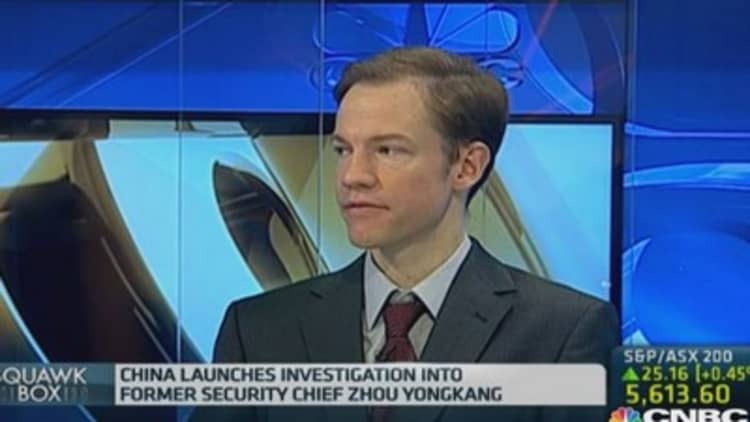
China's ongoing anti-corruption campaign claimed its biggest scalp this week, and some analysts see the government's hard-line stance against graft as a positive for the world's no.2 economy.
"When it comes to the crucial question of whether the leadership will be willing and able to push through difficult structural reforms, its hard-line stance on corruption is a positive sign," said analysts at Capital Economics in a note published on Wednesday.
Former security chief Zhou Yongkang is being investigated for suspected "serious disciplinary violation," state media reported on Tuesday, making him the most senior official to face corruption charges in the history of modern China.
Read MoreChina places former security chief Zhou Yongkang under investigation
The decision to target Zhou - who previously headed up China's Ministry of Public Security - is bound to send shockwaves through the political elite, analysts said.
"Many will see this trend - and today's confirmation that the campaign has reached the highest ranks of the Party - as signaling worrying infighting within the leadership which will diminish the chances of effective policymaking," Capital Economics said.
"From an economic perspective though, we see the leadership's willingness to pursue this campaign as positive for hopes of significant reform," it added.
Read MoreChina's economic reforms: What you need to know
Chinese policy makers announced plans to push through hard-hitting reforms following its Third Plenum meeting in November. The measures included the relaxation of the one-child policy, reform of the welfare system to allow migrants to move more freely around the country, more rights for farmers, financial reform and the opening up of state-owned enterprises (SOEs).
President Xi Jinping has vowed to crack down on official corruption, saying he will target high-flying "tigers" as well as lowly "flies." But many industry watchers have questioned Xi's resolve and policy makers to push through these reforms, which are considered vital for boosting economic growth.
Capital Economics noted that the graft crackdown has taken its toll on certain sectors of the economy, such as luxury goods, hospitality and property, but said overall, the campaign should help China's economic progress.
This is because the crackdown impacts incentives for officials implementing the Third Plenum in two different ways, they said.
Firstly, the more recent display of political power should encourage officials to toe the line and implement the reforms despite opposition, reducing the importance of vested interests.
"Second, it reduces the threat that relaxing state control over the economy will result in large-scale embezzlement that would diminish economic efficiency down the line," it added.
The move is the latest in policy-makers' ongoing campaign to stamp out corruption in the system, and follows a number of high profile arrests, restructuring of the railway and energy sectors and measures to clamp down on gift-giving over the past 18 months.
Read MoreGSK CEO: 'Very committed' to China despite probe
Francis Cheung, head of China and Hong Kong strategy at CLSA, said there was already evidence that the graft crackdown was helping spur reforms, particularly in the railway and energy sectors.
The deputy director of China's National Energy Association was sacked in May amid claims of bribe-taking, while a number of people at state-owned China Railway Construction Corp. were punished for spending over $100 million on hospitality late last year.
"There's been a really high correlation with the corruption campaign and significant changes at the SOEs," Cheung said. "In a country like China, a lot of the SOEs have a lot of vested interests and close connections to the party. In many ways cleaning up corruption has spurred the SOE reforms."
Cheung added however, that although he expected the SOEs to become more efficient as a result of the Third Plenum, making them competitive was another issue, and one which looks to be a longer term goal.
Read MoreFood chains dragged into food scandal
Last year, former politburo member Bo Xilai, was sentenced to life in prison last year for corruption and his role in covering up his wife's murder of a British businessman.
According to FT reports, Zhou is suspected of plotting with Bo before his arrest in early 2012 to block President Xi's ascension to leadership.
Some critics of Xi argue the anti-corruption campaign and the Zhou investigation are a convenient way for the president to neutralize political rivals.


